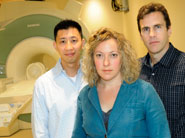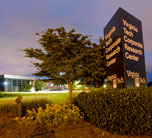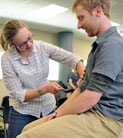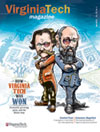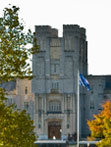 |
|
||||||
|
|
|||||||||||||||||||||||||||||||||||||||||||||||||||||||||||||||||||||||||||||||||||||||||||||||||||||||||||||
|
Virginia Tech, A Job-Development Engine
Land-grant universities like Tech began in order to make America's farms and factories more productive and so always have had strong programs linked to job development. Virginia Tech takes it a step further into the 21st century. We proudly cultivate our entrepreneurial culture and institutional focus on job creation. Indicators abound. The Virginia Tech Corporate Research Center (CRC), the most visible manifestation of the academy/jobs linkage, just completed its successful 25-year build-out of the original concept. Now home to more than 140 companies in 1 million square feet of space and employing more than 2,200 people, the CRC is entering its next phase by creating facilities that will more than double the current research park's size. The newly formed Virginia Tech Carilion Research Institute already has snagged some of the nation's leading scholars and scientists; its annual budget exceeds $20 million and grows rapidly with each new research contract. With the emergence of the institute's partner, the Virginia Tech Carilion School of Medicine, as well as the fact that the CRC-based Virginia College of Osteopathic Medicine graduates more than 200 doctors annually, this region is positioned to develop a significant medical technology infrastructure and biomedical clusters. We expect to see spin-offs or high-tech firms quickly attracted to the area. When Rolls-Royce elected to make its $170 million investment in its first U.S. aircraft engine component factory built from the ground up, it cited access to intellectual capital at Virginia Tech and the University of Virginia as decision drivers. Working with Rolls-Royce, our universities will develop a Commonwealth Center for Advanced Manufacturing near the company's plant south of Petersburg and a jet propulsion lab here on campus. Eventually, Rolls-Royce expects to employ as many as 500 people in Virginia. Supplying graduates to firms, small and large, around the globe, Virginia Tech prepares students who are in high demand. But the strong tech sector deserves special notice here. No longer an "emerging" component of the local economy, technology companies comprise 18 percent of regional employment, according to a 2009 study by the Roanoke Blacksburg Technology Council (RBTC). The local economy added 382 new tech companies between 2002 and 2009, growing from 1,312 to 1,694 business units. These new businesses are concentrated in four categories: computer/networks; systems engineering; software development; and scientific, engineering, or technical consulting. Total tech-sector employment in the region approaches 40,000 jobs. From my standpoint, the RBTC study yielded this very important fact: Proximity to Virginia Tech and its talent was the most frequently mentioned factor for prompting businesses to locate to the region. Alumni who have been gone for more than a few years might be surprised by the vibrant entrepreneurial business sector in Blacksburg and Southwest Virginia. There is a strong business-development infrastructure. Outside venture funds are taking notice and making headway. The CRC and VT KnowledgeWorks also serve as venture funds. VT KnowledgeWorks, a full-spectrum business acceleration center, currently is working with more than 60 firms at all stages of corporate maturity to launch them into the marketplace. Additionally, the RBTC actively nurtures startups and promotes the region to attract tech companies. The Virginia Tech Foundation invests in venture funds, often with the proviso that the funds work with local businesses. Indeed, the foundation is engaged with many economic development ventures, too numerous to mention here. Virginia Tech Intellectual Properties maintains and markets a portfolio of university scholars' inventions. [Editor's note: In future issues, Virginia Tech Magazine will present a more in-depth picture of the university's role as a catalyst of economic development.] Actively inventing the future, your university is playing a vital role in creating the jobs of today and tomorrow. This short column just scratches the surface. Contact us for ways in which you can be part of the Virginia Tech job-development engine. |
|
||||||||||||||||||||||||||||||||||||||||||||||||||||||||||||||||||||||||||||||||||||||||||||||||||||||||||||
|
|
|
|
||||||||||

